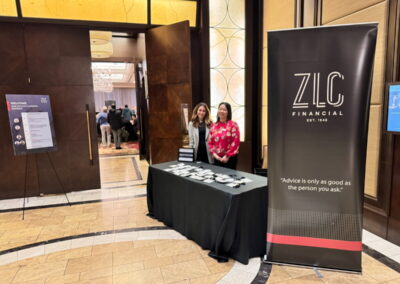Our Associate Farzin Remtulla recently had the opportunity to participate in a panel alongside two other experts in the financial services industry to discuss the impact that COVID-19 has had on:
- small businesses, particularly those that have plans to sell in the near future; and
- employees, particularly those who are nearing and contemplating retirement.
They discussed a number of topics, including:
- Government programs that are available for small businesses that are experiencing financial difficulty in the face of COVID-19.
- What small businesses can do to survive the pandemic and to mitigate the financial impact to their business;
- Whether plans to sell a business or to retire should be reconsidered or put on a temporary hold;
- How to assess one’s financial position and well-being during the pandemic; and
- Tax planning considerations
Has COVID-19 impacted your plans to sell your business or to retire?
Read the entire article below to learn more.
The following article was originally published in the Fall 2020 issue of Advisor’s Edge magazine.
Retirement, business succession plans hit Covid-19 speedbump
Experts help this couple prepare for a sale and rethink retirement options.
The situation
Wilson Eto* spent his year in Argentina sipping Malbec and virtually networking with former colleagues and young people at Toronto tech incubators. Upon the family’s return, he launched Small Batch Consulting Ltd., a firm that advises startup consumer brands like the one where he got his start. Natalia returned to her role as a senior administrator at the college. Both are now 60.
Small Batch Consulting grew steadily over the following decade. The firm generated almost $10 million in revenue last year and had just hired its 20th employee when the Covid-19 pandemic hit. Business ground to a halt; the firm was forced to temporarily lay off half its employees despite accessing the federal government’s wage subsidy, which expires in December.
The businesses Small Batch Consulting advises are in even worse shape. While demand for expertise about web-based consumer brands is soaring, the companies that would pay for those services can no longer afford to.
After 25 years at the college (earning $125,000 per year, with a pension that pays 80% of her salary) Natalia was eagerly eyeing retirement; she was even ready to leave her job early, though her pension would be reduced by 5% each year before age 65. The mortgage on their $1-million home is paid off and the kids are settling into careers: Lionel is a nurse in Vancouver, expecting his first child; Barbara is working in television in Los Angeles. Natalia wants time to visit them and for other travel — including another teaching round in Argentina. She has about $350,000 in an RRSP.
Wilson was in early discussions with a senior manager interested in buying out Small Batch Consulting. Wilson’s not ready to step away entirely, but he liked the idea of gradually handing over the reins and then spending a few more years in an advisory role. He has almost $400,000 split between a TFSA and RRSP, but most of his money is tied up in the business.
Natalia and Wilson are wondering if their plans must be put on hold.
The experts
Bruce Ball, Vice-president of taxation, Chartered Professional Accountants Canada, Toronto
Sloan Levett, Partner and leader, family office services group, Fuller Landau, Toronto
Farzin Remtulla, Associate, ZLC Financial, Vancouver
Covid repercussions
Sloan Levett: Covid-19 has put a significant wrench in Wilson’s business, and perhaps his ability to sell it at maximum value. Natalia needs to consider what this means in terms of her wanting to retire. For many people in this life stage, Covid may delay their ability to retire, or they may need to reassess what type of retirement they would like.
Farzin Remtulla: But I don’t think the pandemic necessarily derails those plans. For Natalia, the question is a financial one: Are her savings and expected income sufficient for her to retire? She’s off to a good start because she has a defined benefit plan that pays 80% of her salary. My suggestion is to consider her source of income in retirement and her net asset position, and weigh that against her estimated expenditures and the liquidity needs of her estate.
For small businesses like Wilson’s, cash is key. He must focus on having enough cash to meet his operating costs. He’s already accessed the wage subsidy. The Canadian Emergency Business Account is another great program. It provides an interest-free loan up to $40,000; 25% of the loan is forgivable so long as you pay it back before Dec. 31, 2022.
Small Batch could access this program so long as payroll was no more than $1.5 million in 2019. Wilson can use the borrowed funds for what the federal government refers to as “non-deferrable expenses,” which include wages, rent payments [and] insurance costs. I suggest maintaining a spreadsheet of how the funds are being deployed in case of an audit.
SL: There’s also the EDC Business Credit Availability Program, a working capital loan program through Export Development Canada, and the Small and Medium-sized Enterprise Loan and Guarantee Program through the Business Development Bank of Canada (BDC). In order to qualify, business owners must have previously been profitable and demonstrate how their business has been negatively impacted by Covid-19. Wilson’s existing bank would underwrite the loan and usually the bank would take 20% of the loan, and the BDC would take 80%.
Sell now, or wait?
SL: Anyone buying now is looking for a discount because of post-Covid uncertainty. Does Wilson have the strength, ability and time to rebuild? Or does he want to exit the business while he can and preserve some value?
FR: Wilson doesn’t have a successor in his family, so he needs to sell at some point. Now is the time to dissect his business and determine where the value is.
Businesses like Wilson’s are generally valued using an income approach, meaning they’re sold as some multiple of the company’s normalized earnings. The challenge in valuing his business in this climate is there’s uncertainty around when his company’s earnings will return to normal, and what that normal looks like.
He needs to figure out how much of the value of his business is corporate value versus personal and goodwill. If Wilson is getting all the contracts and holding the key relationships, that tells me a lot of the value is in Wilson’s personal goodwill. If he wants to get the most out of his business when it’s time to sell, my suggestion is to formulate a plan to introduce a senior manager to his network, and start transferring over key relationships soon — but also cultivate new ones virtually.
Bruce Ball: It’s important he’s still seen as being part of the business, as well. Covid is unprecedented in a lot of ways. If Wilson is not involved in the business much longer, [that could be seen as another] uncertainty. So he should remain a driving force in the business and get it through the pandemic.
SL: Some questions need further fleshing out: Can the underlying business recover to that $10-million revenue mark? What would it take to get back? And is [Wilson] willing to risk waiting and never getting back, versus looking for a buyer today? It all goes back to their retirement goals and capital needs.
FR: One thing Wilson can do is go back to what he was doing in Argentina: networking and rebuilding relationships. Those are going to drive up the value of his company’s earnings.
Tax planning
BB: From a tax perspective, one thing to consider would be having Natalia as a shareholder because there is a capital gains exemption when you sell the business. If Wilson is the only owner right now, he only gets one exemption. It may be possible to do an estate freeze and get her in as a shareholder so she can participate in future value increases and get the capital gains exemption as well.
Assuming he owns the entire company, he can take his shares and transfer them. Essentially, he converts his ownership, which is presumably common shares, into a combination of common shares and preferred shares, which have a fixed value. Natalia can buy the company’s common shares at a nominal price because he’s essentially locked up all the value in the preferred shares. Then, she participates in future growth, and there’s a chance of getting a second capital gains exemption.
Retire now or wait?
SL: Given the uncertain value of Wilson’s business and the steadiness of Natalia’s pension, Natalia may look to delay retiring. She’s 60 now, and waiting five more years adds another 25% to her pension. Over a lifetime, that could cover a potential decline in value of Wilson’s business.
FR: But she’s expressed she wants to retire. It really comes down to a financial decision: number-crunching, running projections and best-case/worst-case scenarios. Does she want to leave a lot of money behind? Do they have a big tax bill? If they don’t have a large liquidity need in their estate, then maybe they have enough to retire.
If Natalia does retire, it would be prudent to consider the asset mix of her and Wilson’s investments. Is she going to be drawing from those funds through retirement? If yes, she may want to reduce the volatility of her portfolio by reducing her equity exposure and increasing the weighting to fixed income or cash-like investments. I always say to consider the amount of return that’s needed to meet your investment objectives, and then compare that to the risk you’re taking. So if a 3% rate of return is needed to meet her objectives, then does a high-risk portfolio targetting 8% make sense?
SL: With the onset of Covid, we have seen a pretty significant drop in interest rates, which has penalized savers. So when they look at their projections, they may have to reduce the rate of return expectations for the foreseeable future. It may force them to take more risk and go into equities because they’re not going to get much in fixed-income returns. It could put them behind from a cost-of-living perspective because, when you factor in inflation and cash, they’ll have less purchasing power.
BB: They’re still young. At 60, I’m not sure there’s enough if she retires now. So I agree: do the cash flow calculation, but 25 to 30 years is a long time for that amount to last.
SL: They can do a sensitivity analysis projection. If Natalia retired today, if Wilson sold his business today, these are the assets they would have, and they can run a sensitivity analysis based on rate of return on this capital. Pick your number: 3%, 5% or 7%. That tells them the amount of income after tax they would generate to support [their] lifestyle.
At the same time, do some planning around the type of lifestyle they want to lead and can lead based on the capital today. With that information, it may help them make a decision. Does it make sense to postpone retiring? Does Wilson sell today or look to enhance value?
BB: The key things for Natalia and Wilson are to figure out how much they’re going to need, how much they think they’ll be spending, and also any planning they can do to improve the ownership structure of the business.
* These are hypothetical clients. Any resemblance to real persons is coincidental.
Answers have been edited for length and clarity
Disclaimer: This information is designed to educate and inform you of strategies and products currently available. The views (including any recommendations) expressed in this commentary are those of the author alone and are not necessarily those of ZLC Financial. This information is not to be construed as investment advice. It is for educational or information purposes only. It is not intended to provide legal, taxation or account advice; as each situation is different, please seek advice based on your specific circumstance. This commentary is not in any respect to be construed as an offer to sell or the solicitation of an offer to buy any securities.
.




